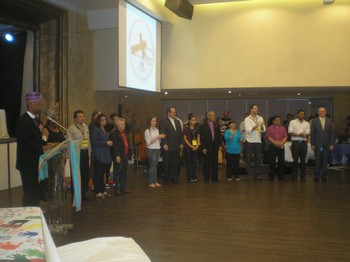Churches are called to a “Samaritan spirituality” of service to neighbors, the Rev. Ofelia Ortega told the sixth Latin American Council of Churches (CLAI) General Assembly at its closing worship service here May 25.
Preaching on the parable of the Good Samaritan, Ortega ― a Cuban Presbyterian theologian, teacher and world-renowned ecumenist ― said, “I am calling us to a Samaritan spiritual revolution, a Christlike spirituality, a eucharistic life in which a life of service becomes internalized in us as we partake.”
Speaking on the eve of Trinity Sunday, Ortega said “the Triune God can always be described as life-giving. This means we must always combat the forces of death and destruction with this theology of life.”
The lesson of the Good Samaritan, she said, is threefold: to see the realities around us (intelligence); to recognize those realities (compassion); and to respond to them (action or service).
“The Samaritan, contrary to the other distinguished persons who just passed on by, saw the man in distress. He had compassion on the man, put him on his own horse and took him to a place where the man could be cared for and healed. The verb in the story means “to feel the hurt of the other ― this is what God does in his heart.”
The church has to create responses to all realities that threaten the biblical “theology of life,” Ortega said, praising CLAI for its Assembly theme: “Affirming Our Ecumenism in Concrete Actions.”
“We have to create responses to reality: shelter, solidarity, hospitality, consolation, healing ― this is where the future is leading us,” she said. “Life is in the streets: in the houses where domestic violence is too often hidden, in the wars that are resisted, in the discrimination that is fought. This theology of life is the key to understanding the world.”
Ecumenism is essential for the church’s witness and action, said Ortega, a president of the World Council of Churches representing Central America and the Caribbean. “Today we have to think of ecclesiological unity ― to be one that the world may believe as Matthew’s gospel says, she said. “In this Assembly our commitment to an ecumenism expressed in concrete gestures reflects the prophecy of Micah: “What the Lord requires of us is to do justice, love mercy and walk humbly with God.”
Ortega called this ability to see and respond in Christlike ways to the realities around us ― in the words of martyred Archishop Oscar Romero of El Salvador ― “the mystery of the open eyes.” That’s the way of the Samaritan, she continued. “Jesus is always calling his followers to go over to the other side: of the road, of the lake, of the cross. “We resist but Jesus won’t let us stand still ― the other side is where God is revealing himself in new and remarkable ways.
“That is what the theology of life is all about.”

